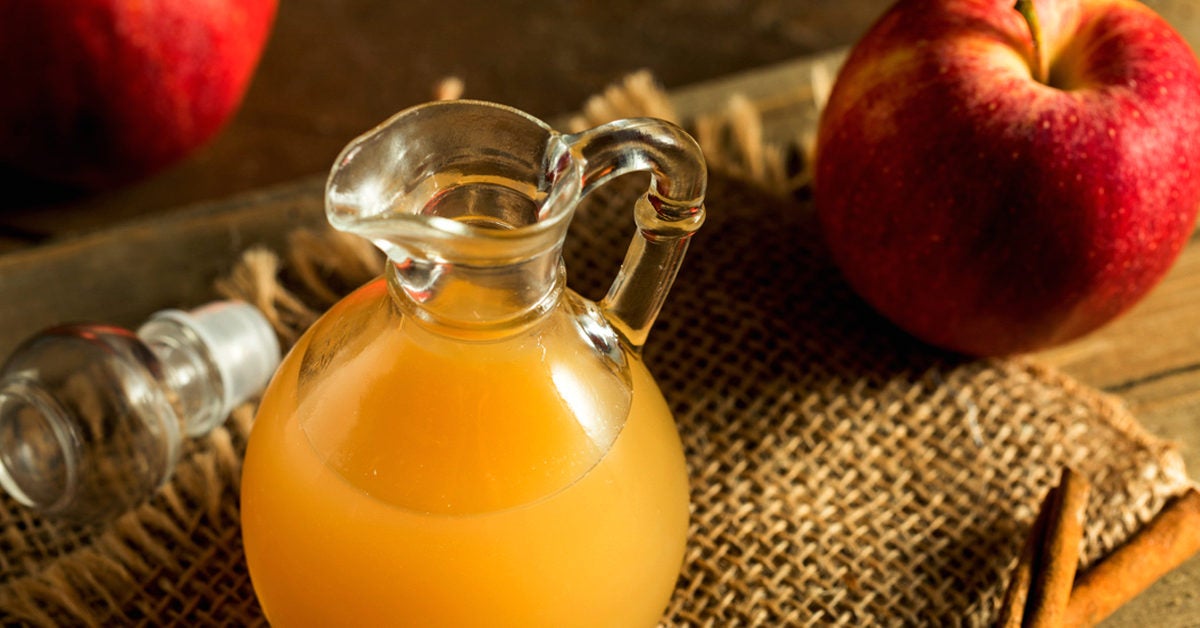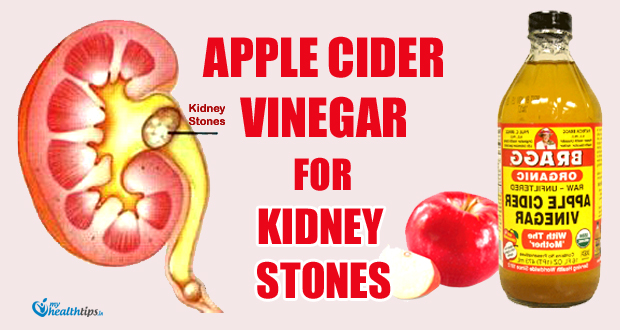Overview

Apple cider vinegar (ACV) has become a popular home remedy for many conditions. Among its purported uses is the ability to dissolve or prevent kidney stones.
Much of the evidence supporting the use of ACV to treat kidney stones is anecdotal. Although there isn’t much research out there, people still regard it as a promising natural treatment option.
Using raw, organic, unfiltered ACV is thought to bring the best results. Continue reading to learn more about its healing powers.
What are kidney stones?

Kidney stones are solid masses of crystalized minerals and salts that develop inside the kidneys and along the urinary tract. Kidney stones happen as the result of a buildup of these minerals in your urine, especially when your urine is concentrated. They vary in size and are often quite painful.
Kidney stones may cause nausea, fever, and painful urination. They’re quite common, especially if you’ve had them before or if they run in your family.
How can apple cider vinegar help?

Some people recommend using ACV as a natural way to treat kidney stones. The acetic acid found in ACV is thought to soften, break down, and dissolve kidney stones. The kidney stones can be reduced in size so that you’re able to easily pass them in your urine.
ACV is said to alkalize blood and urine while increasing stomach acids. This helps prevent new stones from forming and improves digestion.
ACV may even help reduce pain and inflammation from kidney stones. It helps rid the body of toxins and excess minerals that can lead to kidney stones. According to some, ACV has a cleansing effect on the kidney and liver.
What does the research say?
Much of the evidence supporting the use of ACV in treating kidney stones is anecdotal. Solid scientific studies examining the direct effect of ACV on kidney stones are lacking. However, ACV still shows potential in treating kidney stones.
For example, ACV contains trace amounts of potassium, which has been shown to prevent the formation of kidney stones. Research from 2016 found that higher levels of dietary potassium intake were strongly associated with the prevention of kidney stones.
It’s important that you don’t take too much ACV, though, since this can lead to potassium loss. Further research investigating the direct effect of the potassium in ACV in preventing kidney stones is needed.
A 2017 study looked at the effect of different dietary habits on kidney stones. Fermented vinegar was found to have a positive effect on the prevention of stones. It was shown to be significantly linked to a lesser risk of kidney stone formation. Tea and legumes were found to have the same effect. More research is needed to determine the direct effect of vinegar on kidney stones.
According to a 2014 animal study, ACV has a protective effect against kidney oxidative injury and increases antioxidant enzymes. It was also shown to lower cholesterol levels. This could be useful in preventing kidney stones, since higher body weights are associated with kidney stone formation. You’re more likely to have higher cholesterol if you’re overweight.
How to take apple cider vinegar

You can drink ACV if you have kidney stones. It can also be taken regularly as a preventive measure.
Always drink diluted ACV. Undiluted ACV can harm tooth enamel and burn your throat. Rinse your mouth thoroughly after consuming it.
There are several options for taking ACV.
The simplest way to take it is to add 1–2 tablespoons to a glass of water. Try adding 1 tablespoon of raw honey if you want to make it sweeter.
It’s thought that adding lemon juice to ACV can enhance its positive effects on health. This is because lemon juice also contains citrate, which helps to further lower acidity levels in the urine. The citrate can also help prevent new stones from forming and existing stones from becoming bigger. Add 2 ounces of lemon juice to the ACV water.
For what’s been called a powerful kidney stone home remedy, combine:
- 1–2 tablespoons of ACV
- 2 ounces of lemon juice
- 2 ounces of olive oil
Drink this concoction followed by a glass of water.
Another option is to mix 1/2 teaspoon of baking soda and 2 tablespoons of ACV in a glass of warm or lukewarm water. Sodium bicarbonate is the active ingredient in baking soda. It can help alkalize your body and make your urine less acidic. This is thought to help get rid of kidney stones and prevent them from coming back.
You can add ACV to your meals by including it as an ingredient in a host of homemade products, including:
- salad dressings
- sauces or ketchup
- marinades
- mayonnaise
- vinaigrette
- smoothies
ACV is also available in capsule or supplement form. Get it here.
Prevention tips
There are dietary practices that can help prevent kidney stones. Here are some guidelines and recommendations:
- Reduce your salt intake.
- Limit your sugar intake.
- Drink at least 64 ounces of water daily.
- Avoid processed foods.
- Limit acidic foods.
- Increase your calcium intake with low-fat dairy foods.
- Eat whole grains and nuts.
- Avoid refined carbs.
- Maintain a healthy body weight.
- Eat plant-based proteins such as quinoa, lentils, and dried beans.
- Eat plenty of fresh fruits and vegetables.
- Limit high-fat foods.
- Eat fewer high-oxalate foods.
- Eat foods rich in magnesium.
- Eat less animal protein, especially red and processed meats.
- Avoid vitamin C supplements.
The takeaway
It’s important that you take care of your health if you have kidney stones. Schedule an appointment with your doctor if your condition doesn’t improve, or if your symptoms worsen or become severe.
In some cases, kidney stones require medical treatment in order to avoid complications. Only your doctor can tell you whether it’s safe to take a wait-and-see approach to your stones while trying a home remedy like ACV.
As a preventive measure, it’s a good idea to make a point to improve your lifestyle to maintain excellent health. Eat a healthy diet, exercise regularly, and take steps to avoid stress. Make sure you get plenty of rest so that you have enough energy to function well.
It’s especially important that you take care of yourself if you’ve had kidney stones in the past or if they’re prevalent in your family.


